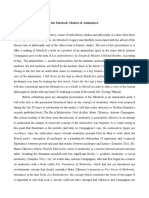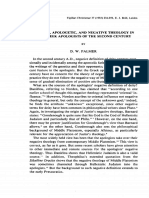Humanism in Sartre's Philosophy: Banashree Bhardwaj
Humanism in Sartre's Philosophy: Banashree Bhardwaj
Uploaded by
inventionjournalsCopyright:
Available Formats
Humanism in Sartre's Philosophy: Banashree Bhardwaj
Humanism in Sartre's Philosophy: Banashree Bhardwaj
Uploaded by
inventionjournalsOriginal Title
Copyright
Available Formats
Share this document
Did you find this document useful?
Is this content inappropriate?
Copyright:
Available Formats
Humanism in Sartre's Philosophy: Banashree Bhardwaj
Humanism in Sartre's Philosophy: Banashree Bhardwaj
Uploaded by
inventionjournalsCopyright:
Available Formats
International Journal of Humanities and Social Science Invention ISSN (Online): 2319 7722, ISSN (Print): 2319 7714
14 www.ijhssi.org Volume 3 Issue 2 February 2014 PP.12-14
Humanism in Sartres Philosophy
Banashree Bhardwaj
Department of Philosophy, Kokrajhar Govt. College, Assam, India
ABSTRACT: The best part of Jean Paul Sartre (1905-1980), the most prominent figure of existentialist
movement was his advocacy of humanism. As an atheist and a humanist, his primary concern was man. He gave much importance on human freedom. In his word man is born free. Sartre equalised human existence and freedom. Whatever happened in the world had its significance because of man. For Sartre, it is man who builds up the world by his actions. So, mans action needs to be considered with reason, justification and an understanding that ones decision will have an impact on the rest of the society. The basic concept created by existentialist movement was existence prior to essence. Sartre believes that a man first of all exists and it is through all of his actions that he is able to define who he is and before actions are executed, man is nothing more than a thought. Sartres humanism is the philosophy of eternal concerns of man which are today more pressing than ever before. Since Sartres existentialism is concerned with mans freedom and its aim is to change its readers or to free from illusion, therefore it always been taught as a practical philosophy. Thus, present paper is an attempt to analyse Sartres humanism and its distinctive features.
KEYWORDS: Essence, Existentialism, Freedom, Humanism, Illusion I. INTRODUCTION
Sartrian existentialism is a popular kind of philosophical activity which flourished in the 1940s and 1950s is a somewhat incompatible set of ideas taken from the writings of Karl Marx, S. Kierkegaard, Nietzsche, Bergson, Husserl and Heidegger. Being the creative writer, social scientist Sartre gave an antiscience version of humanism that is still strongly influencing the members of the humanist community especially in Europe. In 1946, Sartre published a book entitled Existentialism and Humanism in which he presented existentialism in the form of humanism. His existentialism is concerned, unlike other philosophies with the problem of being than the problem of becoming; more with the particulars than with the universals; more with existence than essences. So, it would not be exaggeration to say that an account of Sartres existentialism is identical with that of his humanism.
II.
CENTRAL THEME
In his earlier work Nausea, Sartre rejected the kind of humanism which he found unacceptable which denies the primacy of individual choice. According to this humanism, one may take credit for the achievements of others on the grounds that we share humanity with them, so that their achievements are own. But there is another concept of humanism implicit in Sartres existentialism. Sartres humanism alway s emphasises the ability of individual beings to transcend their individual circumstance and act on behalf of all humans. The fact that Sartre maintains the only universe we have is a human universe and the laws of universe are made by human beings. There is no God operating behind the scene to give human reality a goal outside himself and to generate laws to goverm human behaviour. Sartre says, by nothing that even if there were such a God nothing would be different and humans would have to remain their own moral compass.
III.
THE DISTINCTIVE FACTORS
Sartres humanism involves some distinctive features. When we analyse his account of existentialism the following points will stand out in favour of humanism 1) The central theme runs through all Sartre s work is his passionate interest in human beings. Sartre lays greater emphasis on human existence. Before Sartre, St. Thomas Aquinas also had given greater emphasis on existence than essence. Sartre holds that there is only one being whose existence comes before its essence- that being is man. He wrote, First of all man exists, turns up, appears on the scene and only afterwards defines himself. So, for him, man first of all is nothing. In fact in the philosophy of Sartre, the idea of existence gets associated with the idea of nothingness. To exist, in the primordial sense is to be nothing. One is here reminded of Hegels celebrated statement spirit is the negative. To exist means to exist as being-for-itself. Being-for-itself is characterized by consciousness. Consciousness, in the philosophy of Sartre is pure spontaneity confronting the world of objects. The world is characterized
www.ijhssi.org
12 | P a g e
Humanism In Sartres Philosophy...
by inertness. Consciousness while confronting this inertness appears as spontaneity. So, we can say that in Sartres philosophy existence is itself characterized by spontaneity. 2) In explaining the nature of human existence, Sartre brought the idea of transcendence also. An element of self-transcendence is clearly present in human existence. Sartre wrote, Human reality is it s own surpassing towards what it lacks. The experience of lack or absence itself is painful experience. So, human reality or existence is so constituted that an element of suffering is clearly present in human existence. Therefore, human existence is called by Sartre, an unhappy consciousness. The idea of unhappy consciousness first appears in Hegel. Sartre borrowed it from Hegel. But for Hegel, unhappy consciousness is a stage in the process of development while for Sartre is existential predicament. 3) The third significant concept involves in Sartres humanism is the concept of freedom. Man is born free. He cannot find anything to depend upon either within or outside himself. Sartre holds that our existence is absolutely free and it consists in developing our life in full freedom. This freedom brings responsibility. Freedom exists for us in two forms (a) freedom of choice, (b) choice of freedom. If we are free(a) we must be free to choose, but (b) we can make either a choice which really makes me free or a wrong choice which enslaves us again. Since we are free to choose our actions therefore we are responsible for all our actions. That is why man can control his nature. When we say that man is responsible for himself, we do not mean that he is responsible for his own individuality but that he is responsible for all men. What we choose is always better; and nothing can be better for all unless it is better for all. Thus, our responsibility is much greater than we had supposed for it concerns entire mankind. 4) In Sartres humanism, apart from the idea of individual freedom, the idea of human uniqueness is also recognised. Sartre always emphasises upon individual existence. Existence means for them a full, vital, self-conscious, responsible and growing life. Man cannot enjoy a holiday. Every moment he is creating himself. Man cannot define his pre-history of birth. But it is possible to define himself gradually. He knows that he is not complete and not perfect. According to Sartre, I am free to perform chosen acts, free to impose meaning and significance upon the brute facts. The recognition of this factor enables Sartre to introduce a very important factor. This factor is the distinction between levels of existence i.e. the authentic level and inauthentic level of existence. In authentic level of existence I realise that I am not endowed with readymade essence. I am originally nothing. I am to create my essence through my freely chosen acts. So we can make ourselves. Man is the own maker of his fate. Thus, a kind of activist programme is present in Sartres humanism. 5) A very important concept is the concept of abandonment, a favourite word of Heidegger. I am abandoned in this world. This concept goes hand in hand with Sartres atheistic existentialism. In fact in the philosophy of Sartre, humanism and atheism is closely associated. Nietzsche had declared that God is dead and Sartre by following him upholds atheism. According to Sartre, because there is no God therefore, there is no value following from God. Man is always a possibility. Man is to create his value and project his values upon the external world. We ourselves decide our being. As F. Ponge has truly written-Man is the future of man. That is what Sartre meant by abandonment.
IV.
CRITICISM
It is usually admitted that Sartre has overemphasised upon tragic part of human existence. It is due to his one sided observation. A despair of existence cannot be the finality of life. The feeling of joy has been established by the mankind as a positive goal because this feeling is its own free choice. Critics have pointed out that it is error to state that despair is the law of reality and hopelessness is the final word regarding the universal process.
V.
CONCLUSION
However, the above mentioned objection is not tenable. We suffer from anxiety and despair because we are worried about the result of our action. Thus, in conclusion it would be wrong to say that Sartres humanism is a philosophy of quietism since it defines man by his action; nor as a pessimistic description of man since the destiny of man is placed within himself; nor is it an attempt to discourage man from action since there is no hope except in his action and the one thing which permits him to have life is the deed. Therefore, Sartres humanism is not too individualistic as to negate social dimensions. Sartre clearly states that when I choose something I choose it for the entire mankind. Thus, we find ourselves in a world that is of intersubjectivity in which man has to decide what he is and what others are. If man expresses his genuine humanity in his behaviour he will never deceive himself. Sartres humanism is the philosophy of eternal concerns of man which are today more pressing than ever before. Since Sartres existentialism is concerned with mans freedom and its aim is to change its readers or to free from illusion therefore it always been taught as a practical philosophy.
www.ijhssi.org
13 | P a g e
Humanism In Sartres Philosophy... REFERENCES
[1] [2] [3] [4] [5] [6] [7] Sartre, J.P: Existentialism and Humanism, 1946 Hutcheon, P.D: The existential Humanism of J.P. Sartre. Internet encyclopaedia of philosophy: Existentialism is Humanism. Encyclopaedia of Philosophy, Vol.3: Relevant chapters. Pass more, J.: Hundred Years of Philosophy, Penguin Books,1994 Thilly. F: History of Philosophy Bhattacharjee, Dr. J: Contemporary Western Philosophy, Book Emporium, Guwahati(Assam)-1.
www.ijhssi.org
14 | P a g e
You might also like
- Module 2.1Document3 pagesModule 2.1Allan PatricioNo ratings yet
- Advaita - Ken Wilber - From You To Infinity in Three PagesDocument3 pagesAdvaita - Ken Wilber - From You To Infinity in Three PagesPaisaje Silencioso100% (1)
- Topic 1..Document14 pagesTopic 1..Małgorzata KosiórNo ratings yet
- Consciousness-ExplainedDocument10 pagesConsciousness-ExplainedmilaNo ratings yet
- Improper Bodies: A Nihilistic Meditation On Sexuality, The Black Belly, and Sexual DifferenceDocument18 pagesImproper Bodies: A Nihilistic Meditation On Sexuality, The Black Belly, and Sexual DifferenceMthunzi DlaminiNo ratings yet
- Theorizing Posthuman: Neil Badmington's ViewsDocument4 pagesTheorizing Posthuman: Neil Badmington's Viewsankitagoel737100% (1)
- Notes On The Genealogy of MoralsDocument68 pagesNotes On The Genealogy of MoralsPaula LNo ratings yet
- Modiri - Colour of LawDocument1 pageModiri - Colour of LawDonata Maria Katherina EickNo ratings yet
- Just For The Thrill Sycophantizing Aristotle's - PoeticsDocument14 pagesJust For The Thrill Sycophantizing Aristotle's - PoeticsEVIP1No ratings yet
- Confucius and Kant: Two Concepts On RespectDocument8 pagesConfucius and Kant: Two Concepts On RespectAlvin Jason BravoNo ratings yet
- A2 AnthropocentrismDocument18 pagesA2 AnthropocentrismJonathan Cantu100% (1)
- 1.OKANRAN OGBE 15 Files Merged PDFDocument152 pages1.OKANRAN OGBE 15 Files Merged PDFregis75% (4)
- Sjg6533 - Gurps 3e - Sourcebook - ShapeshiftersDocument352 pagesSjg6533 - Gurps 3e - Sourcebook - ShapeshiftersHoward DayNo ratings yet
- Iaoue - DefinitionDocument7 pagesIaoue - Definitionabnergalvez100% (1)
- Existentialism Essay 2-Sartre OutlineDocument4 pagesExistentialism Essay 2-Sartre OutlinespmccroskeyNo ratings yet
- Zizek The Actuality of Ayn RandDocument14 pagesZizek The Actuality of Ayn RandSabrina RosaNo ratings yet
- More Than 100 Million Women MissingDocument11 pagesMore Than 100 Million Women MissingSaleem Farooq AbdullaNo ratings yet
- Uma JayaramanDocument15 pagesUma JayaramanSiva KumaravelNo ratings yet
- Double-Scope Stories: Mark TurnerDocument4 pagesDouble-Scope Stories: Mark TurnerVishakha KhajuriaNo ratings yet
- Being and Nothingness The Look SartreDocument3 pagesBeing and Nothingness The Look Sartremaximomore50% (4)
- Kant EthicsDocument4 pagesKant EthicsChristopherAdamsNo ratings yet
- Binary OppositionDocument1 pageBinary Oppositionsimplenirob75No ratings yet
- Allen Reginald E.1960.Socratic Paradox.Document11 pagesAllen Reginald E.1960.Socratic Paradox.Carlos AugustoNo ratings yet
- Trauma TheoryDocument6 pagesTrauma Theoryapi-279674060No ratings yet
- Annas Virtue Ethics and Social PsychologyDocument40 pagesAnnas Virtue Ethics and Social PsychologybrainbucketNo ratings yet
- The Das Man, Overman, and Skeptic in Richard Bach's Jonathan Livingston SeagullDocument9 pagesThe Das Man, Overman, and Skeptic in Richard Bach's Jonathan Livingston SeagullAbu PobleteNo ratings yet
- I. Lecture Notes: Socrates' Defense and The Ring of GygesDocument10 pagesI. Lecture Notes: Socrates' Defense and The Ring of GygesBoram LeeNo ratings yet
- Albert Caraco Anonymous Translation of HDocument12 pagesAlbert Caraco Anonymous Translation of Hevan petersNo ratings yet
- Excerpt From "Personality: How It Forms" by Henry KellermanDocument204 pagesExcerpt From "Personality: How It Forms" by Henry Kellermanwamu885No ratings yet
- Existentialism Criticism Essay PDFDocument5 pagesExistentialism Criticism Essay PDFapi-266588958100% (1)
- Hegel's Absolute Idealism and His Dialectical Process of UnderstandingDocument2 pagesHegel's Absolute Idealism and His Dialectical Process of UnderstandingZaky AyatillahNo ratings yet
- Schopenhauer - Metaphysics of LoveDocument31 pagesSchopenhauer - Metaphysics of Loveblacksheep17No ratings yet
- The ALL NEW Don't Think of An Elephant! - CH 6: The Private Depends On The PublicDocument7 pagesThe ALL NEW Don't Think of An Elephant! - CH 6: The Private Depends On The PublicChelsea Green PublishingNo ratings yet
- Ibn Sina Al-Gazali and Ibn Taymiyyah On PDFDocument31 pagesIbn Sina Al-Gazali and Ibn Taymiyyah On PDFastrojin77No ratings yet
- Critically Discuss Nietzsche's Critique of Christian MoralityDocument9 pagesCritically Discuss Nietzsche's Critique of Christian Moralitytheonewman1234No ratings yet
- RamanujaDocument12 pagesRamanujaH to O ChemistryNo ratings yet
- KalergiandHart CellerandMemeticsWhiteAntifragilityDocument17 pagesKalergiandHart CellerandMemeticsWhiteAntifragilityaston-91100% (1)
- Hannah ArendtDocument15 pagesHannah ArendtRohit KumarNo ratings yet
- Indian Theory of ErrorDocument3 pagesIndian Theory of ErrorDivya KailajeNo ratings yet
- Ayn Rand Anthem EssayDocument3 pagesAyn Rand Anthem Essayapi-317441014No ratings yet
- Spinoza - The Three Kinds of KnowledgeDocument2 pagesSpinoza - The Three Kinds of KnowledgeAhmadNo ratings yet
- AlakkaDocument3 pagesAlakkaGaurav SinghNo ratings yet
- Kant, Immanuel - Was Ist AufklarungDocument4 pagesKant, Immanuel - Was Ist AufklarungPaolo GalangNo ratings yet
- Similarities and Differences in British Empiricists' PhilosophiesDocument7 pagesSimilarities and Differences in British Empiricists' PhilosophiesTu Anh NguyenNo ratings yet
- 2A Empiricism, Rationalism, and KantDocument33 pages2A Empiricism, Rationalism, and KantManoj JangidNo ratings yet
- Friedrich Nietzsche On The Meaning of The Earth. by Simón Royo.Document19 pagesFriedrich Nietzsche On The Meaning of The Earth. by Simón Royo.Daniel CifuentesNo ratings yet
- Iris Murdoch Modern and AntimodernDocument6 pagesIris Murdoch Modern and AntimodernCoordinación General ETEPENo ratings yet
- Constance Garnett) Notes From-Underground PDFDocument85 pagesConstance Garnett) Notes From-Underground PDFSoumyajit PradhanNo ratings yet
- Contours of Agency - Essays On Themes From Harry Frankfurt by Sarah Buss and Lee OvertonDocument5 pagesContours of Agency - Essays On Themes From Harry Frankfurt by Sarah Buss and Lee OvertonHabib G. Moutran BarrosoNo ratings yet
- Kantian Distinctions in The Resolution of The Third Antinomy - LagdameoDocument16 pagesKantian Distinctions in The Resolution of The Third Antinomy - LagdameofedzmeoNo ratings yet
- Palmer1983 ATHEISM, APOLOGETIC, AND NEGATIVE THEOLOGY IN THE GREEK APOLOGISTS OF THE SECOND CENTURY PDFDocument26 pagesPalmer1983 ATHEISM, APOLOGETIC, AND NEGATIVE THEOLOGY IN THE GREEK APOLOGISTS OF THE SECOND CENTURY PDFHaeresiologistNo ratings yet
- Albahari, Miri, Against No-Atman Theories of Anatta (Ap 02) PDFDocument16 pagesAlbahari, Miri, Against No-Atman Theories of Anatta (Ap 02) PDFGediminas GiedraitisNo ratings yet
- Aristocratic Radicalism or Anarchy? An Examination of Nietzsche's Doctrine of Will To PowerDocument29 pagesAristocratic Radicalism or Anarchy? An Examination of Nietzsche's Doctrine of Will To Power9370201049No ratings yet
- Mohamed Jean Veneuse Anarca IslamDocument114 pagesMohamed Jean Veneuse Anarca IslamAbu AliNo ratings yet
- 03 Edamura TheDeisticGod 124 PDFDocument14 pages03 Edamura TheDeisticGod 124 PDFPurandarNo ratings yet
- Nietzsche's Three Steps To A Meaningful Life - Lessons From History - MediumDocument12 pagesNietzsche's Three Steps To A Meaningful Life - Lessons From History - MediumRosa García MoraNo ratings yet
- Rene Descartes Philosophy and IdeasDocument3 pagesRene Descartes Philosophy and IdeasNairah DimakutaNo ratings yet
- Prototype Theory and Meaning PDFDocument405 pagesPrototype Theory and Meaning PDFNaddiNo ratings yet
- Ellen Rooney and Elizabeth Weed D I F F e R e N C e S in The Shadows of The Digital HumanitiesDocument173 pagesEllen Rooney and Elizabeth Weed D I F F e R e N C e S in The Shadows of The Digital HumanitiesLove KindstrandNo ratings yet
- Philosophical Interpretation Of: "Strange Case of Dr. Jekyll and Mr. Hyde"Document9 pagesPhilosophical Interpretation Of: "Strange Case of Dr. Jekyll and Mr. Hyde"daleNo ratings yet
- Intersectionality and The Taboo of Abstraction in Feminist TheoryDocument14 pagesIntersectionality and The Taboo of Abstraction in Feminist TheoryNome Tokeslos Melindres100% (1)
- Inter-Caste or Inter-Religious Marriages and Honour Related Violence in IndiaDocument5 pagesInter-Caste or Inter-Religious Marriages and Honour Related Violence in IndiainventionjournalsNo ratings yet
- The Usage and Understanding of Information and Communication Technology On Housewife in Family Welfare Empowerment Organization in Manado CityDocument10 pagesThe Usage and Understanding of Information and Communication Technology On Housewife in Family Welfare Empowerment Organization in Manado CityinventionjournalsNo ratings yet
- Student Engagement: A Comparative Analysis of Traditional and Nontradional Students Attending Historically Black Colleges and UniversitiesDocument12 pagesStudent Engagement: A Comparative Analysis of Traditional and Nontradional Students Attending Historically Black Colleges and Universitiesinventionjournals100% (1)
- Non-Linear Analysis of Steel Frames Subjected To Seismic ForceDocument12 pagesNon-Linear Analysis of Steel Frames Subjected To Seismic ForceinventionjournalsNo ratings yet
- A Critical Survey of The MahabhartaDocument2 pagesA Critical Survey of The MahabhartainventionjournalsNo ratings yet
- Effect of P-Delta Due To Different Eccentricities in Tall StructuresDocument8 pagesEffect of P-Delta Due To Different Eccentricities in Tall StructuresinventionjournalsNo ratings yet
- Non-Linear Analysis of Steel Frames Subjected To Seismic ForceDocument12 pagesNon-Linear Analysis of Steel Frames Subjected To Seismic ForceinventionjournalsNo ratings yet
- Effect of P-Delta Due To Different Eccentricities in Tall StructuresDocument8 pagesEffect of P-Delta Due To Different Eccentricities in Tall StructuresinventionjournalsNo ratings yet
- A Novel Bayes Factor For Inverse Model Selection Problem Based On Inverse Reference DistributionDocument4 pagesA Novel Bayes Factor For Inverse Model Selection Problem Based On Inverse Reference DistributioninventionjournalsNo ratings yet
- Immobilization and Death of Bacteria by Flora Seal Microbial SealantDocument6 pagesImmobilization and Death of Bacteria by Flora Seal Microbial SealantinventionjournalsNo ratings yet
- Inter-Caste or Inter-Religious Marriages and Honour Related Violence in IndiaDocument5 pagesInter-Caste or Inter-Religious Marriages and Honour Related Violence in IndiainventionjournalsNo ratings yet
- Oedipus RexDocument64 pagesOedipus RexgirldollsNo ratings yet
- The Theology of Christmas PresentsDocument4 pagesThe Theology of Christmas PresentsSister MariaNo ratings yet
- 1 - Check Off List of Bible Study ToolsDocument4 pages1 - Check Off List of Bible Study ToolsBible_lover_BillNo ratings yet
- Lynette HoppeDocument13 pagesLynette HoppeMishaNo ratings yet
- What GodDocument150 pagesWhat GodGillertNo ratings yet
- Conscience: Subjective Norm of MoralityDocument24 pagesConscience: Subjective Norm of MoralityNate RiverNo ratings yet
- Laterr House.Document23 pagesLaterr House.Akwai Elisha AkwaiNo ratings yet
- Hebrew CalendarDocument28 pagesHebrew CalendarPaul Vincent GilbuenaNo ratings yet
- Communing With God - TozerDocument19 pagesCommuning With God - TozerHenry NjokuNo ratings yet
- Galatians Bible Study Discussion NotesDocument230 pagesGalatians Bible Study Discussion NotesDominic Ang100% (1)
- Islamic Boys NamesDocument20 pagesIslamic Boys NamesarfanbadshahNo ratings yet
- Precession of The EquinoxesDocument14 pagesPrecession of The EquinoxesprivatnoNo ratings yet
- Early Christian & ByzantineDocument54 pagesEarly Christian & ByzantineEdmund Chui100% (1)
- July, Aug, Sept 2013 (Seize The Day - Keep The Sabbath Holy (Part 2) )Document40 pagesJuly, Aug, Sept 2013 (Seize The Day - Keep The Sabbath Holy (Part 2) )Adventist_TruthNo ratings yet
- Liturgy Muisc in WorshipDocument7 pagesLiturgy Muisc in WorshipSola AdetutuNo ratings yet
- Life of Anthony Bacon PDFDocument29 pagesLife of Anthony Bacon PDFcottchen6605No ratings yet
- The Legacy of John Paul IIDocument295 pagesThe Legacy of John Paul IIAgnes BereczNo ratings yet
- SamDocument83 pagesSamManjrekar RohanNo ratings yet
- Apostle of PerversionDocument5 pagesApostle of Perversionarhodes777No ratings yet
- CD-Module 12 Q3Document5 pagesCD-Module 12 Q3kristine kaye malonesNo ratings yet
- The Real Meaning of Lazarus..Document8 pagesThe Real Meaning of Lazarus..GM114No ratings yet
- Marriage Reading Selections Binder EnDocument54 pagesMarriage Reading Selections Binder Enalejo616No ratings yet
- RKM Propagating The Opposite of What Vivekananda and Ramakrishna Had Said: Call To The Rank and File at RKM! Stand Up and Uphold The TruthDocument140 pagesRKM Propagating The Opposite of What Vivekananda and Ramakrishna Had Said: Call To The Rank and File at RKM! Stand Up and Uphold The TruthMaanoj Rakhit / Yashodharma80% (5)
- The Book of GenesisDocument42 pagesThe Book of GenesisHermanodeJesus100% (1)
- Kidd, Judith A Behind The Image Understanding The Old Testament in Medieval ArtDocument285 pagesKidd, Judith A Behind The Image Understanding The Old Testament in Medieval ArtMariella Giorgini100% (1)
- 2013 - 8 May - ST John Divine Theologian Apostle EvangelistDocument12 pages2013 - 8 May - ST John Divine Theologian Apostle EvangelistMarguerite PaizisNo ratings yet
- Genderswap Henry&lizDocument4 pagesGenderswap Henry&lizPao Hernández BáezNo ratings yet

































































































